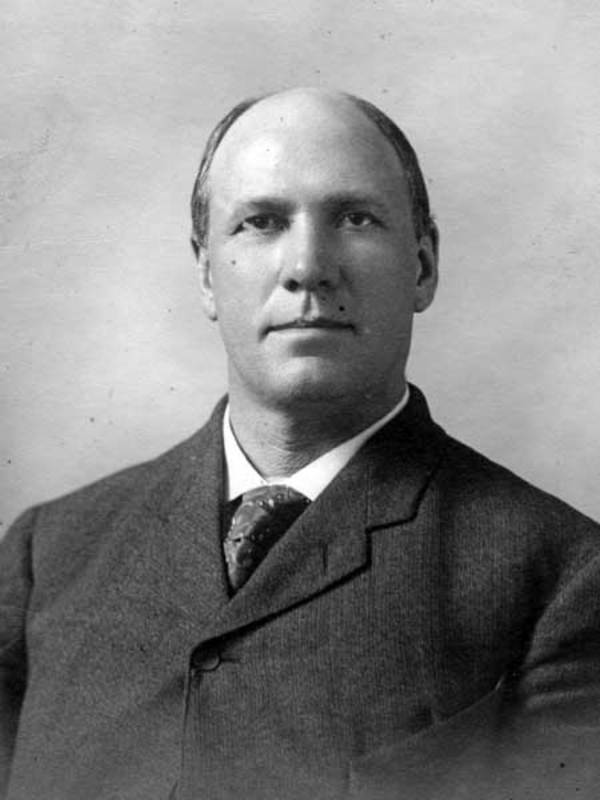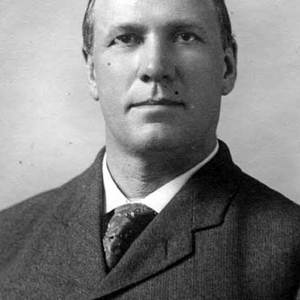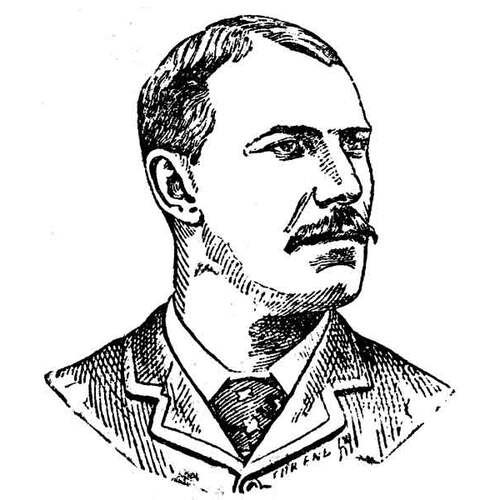
Source: Link
WINKLER, VALENTINE, merchant, farmer, and politician; b. 18 March 1864 in Neustadt, Upper Canada, 11th of the 13 children of David Winkler and Barbara Juliana Lang; m. 31 March 1886 Josephine Rombough in Morden, Man., and they had two sons and three daughters; d. there 7 June 1920.
Valentine Winkler’s father was born in Daisbach (Germany), the son of Lutherans who were to immigrate to Upper Canada in 1834 and settle in the region later known as Waterloo County. In 1853 David Winkler cleared vacant land in Normanby Township, Grey County, and built his home in what would become the village of Neustadt. There he established a sawmill and a flour mill and quickly became one of the leading men of the township. Valentine’s mother, who had come to Canada in 1846, was also a native of Germany.
Valentine was educated in the public schools of Neustadt. On the death of his father in 1879, he left Ontario for Manitoba. The youngest of six sons, he stood to inherit little of the family estate while his mother still lived and consequently he struck out to win his fortune. His elder brother Enoch had left in 1874 at the request of Jacob Yost Shantz*, who was helping Russian Mennonite immigrants to settle in Manitoba. Shantz had persuaded Enoch, who spoke English and German, to accompany the Mennonites as an interpreter. Enoch remained in Manitoba and set up a lumber business in Emerson to serve the Mennonite settlers. Five years later Valentine joined him. This move began a business and political relationship with the Mennonites of southern Manitoba which would last the rest of Valentine’s life.
For two years Valentine worked for his brother, learning the lumber business. In 1881 he was sent to Gretna to open a lumberyard and grain warehouse. Gretna had only recently been established, as a result of the decision of the Canadian Pacific Railway to build a branch line which would connect with the Great Northern Railroad at Neche, N.Dak. Realizing that this branch line traversed the Mennonites’ West Reserve and that Gretna lay in the heart of the new Mennonite settlement, Enoch saw an excellent opportunity and he opened one of the town’s first businesses, with Valentine in charge. Two years later, when the CPR surveyed a town-site on the western edge of the West Reserve at Morden, Enoch further expanded his lumber firm. Again, Valentine was sent to open the new branch.
In 1886 Valentine Winkler married Josephine Rombough, the daughter of a dominion land surveyor who had moved to the Morden area from Ontario. By this time Winkler had bought a farm close to Morden and in 1888 he began farming. His own business operations expanded in 1892 when he founded the nearby town of Winkler. The land had initially belonged to a Mennonite farmer named Isaac Wiens, but because of the Mennonite church’s disapproval of members moving to town, Wiens was advised to have nothing to do with the establishment of a town-site on his land. Taking advantage of an excellent business opportunity, Winkler traded his land for Wiens’s. He quickly surveyed the town-site and opened a lumber, grain, and land business. To help develop the town, he gave the CPR every second block on the site, in return for which the CPR built a station at the siding in 1898.
Soon after his marriage Winkler had become involved in politics. His ability to speak German and his business dealings with the Mennonites east of Morden won him their political confidence. Through his marriage he had close ties to the colonists from Ontario who settled west of Morden. In 1890 he was elected the first reeve of the rural municipality of Stanley and he was soon organizing events in the area for the Liberal party. In 1892 the provincial Liberals persuaded him to run for election to the Legislative Assembly of Manitoba and he won easily in the constituency of Rhineland (after 1914 Morden and Rhineland), becoming a back-bencher in the government of Thomas Greenway*. He retained his seat in the general election of 1896. Three years later he was re-elected, despite the defeat of the Greenway government. In 1900, at the urging of the federal Liberal party, he resigned his seat to contest the federal constituency of Lisgar in an attempt to unseat Robert Lorne Richardson*. A former Liberal, Richardson had left the party after mp Clifford Sifton* was chosen by Prime Minister Wilfrid Laurier to represent Manitoba in the federal cabinet. Although Winkler was defeated, he was re-elected to the assembly in the by-election held to fill the seat he had vacated. He would retain it until his death in 1920.
When the Liberals were swept back into power in Manitoba in May 1915 following the resignation of the government of Sir Rodmond Palen Roblin* over a scandal, Premier Tobias Crawford Norris* appointed Winkler minister of agriculture and immigration. Winkler was offered this important post despite the fact that he was not a good public speaker, in part because he was a farmer, in part because he was the longest-sitting member on the Liberal benches, but probably most because of his reputation for integrity. The scandal involving the Roblin government had discredited politicians in Manitoba, so the Liberals under Norris were anxious to restore some credibility to the party system. As minister, Winkler authored a number of progressive acts, such as the amended Noxious Weeds Act, the Live Stock Purchase and Sale Act, the Farm Implement Act, and the Settlers’ Animal Purchase Act. This last act was also known as the “Winkler cow scheme” because it was a special project of his which provided one to five cows on the lowest terms of credit to needy settlers in the interlake area. Winkler and his ministry were involved as well in a number of experimental attempts to prime the pump of rural credit in the province. The Manitoba Farm Loans Act and the Rural Credits Act provided farmers with new sources of credit from local and provincial revenues.
Despite these and other initiatives Winkler and the Department of Agriculture and Immigration came under attack from farm groups as early as 1917 for being inefficient, unorganized, and out of touch with farmers. There were calls that Winkler should be dismissed and replaced by the federal minister of agriculture, Thomas Alexander Crerar*, a Manitoba mp. Although nothing came of these demands, they were an early indication that farmers were losing patience with the Liberal government. Winkler himself remained popular in his own constituency, as was indicated by his retention of most of the Mennonite votes despite the fact that the Norris government had passed school legislation extremely unpopular among Manitoba Mennonites. He was expected to win re-election by acclamation in the election of June 1920, but died earlier that month of erysipelas, probably associated with the diabetes from which he suffered. He was buried on 9 June in the family plot in Morden. His son Howard Waldemar would represent Lisgar in the House of Commons from 1935 to 1953. In 1980 Valentine Winkler was inducted into Manitoba’s Agricultural Hall of Fame.
PAM, GR 1662; MG 14, B44; B45. Private arch., Gerhard Ens (Winnipeg), Morris Mott, “Rural disillusionment: T. C. Norris and Manitoba’s farmers” (1989). Manitoba Free Press, 13 May 1915, 10 June 1920. Manitoba Gazette (Winnipeg), 1892–1920. Frank Brown, A history of the town of Winkler, Manitoba (Winkler, 1973). Canadian annual rev. (Hopkins), 1914–20. CPG, 1892–1920. J. A. Hilts, “The political career of Thomas Greenway” (phd thesis, Univ. of Man., Winnipeg, 1974). Man., Legislative Assembly, Journals, 1914–20. W. L. Morton, Manitoba: a history (2nd ed., Toronto, 1967). Lionel Orlikow, “The reform movement in Manitoba, 1910–1915,” in Historical essays on the prairie provinces, ed. Donald Swainson (Toronto and Montreal, 1970), 215–29.
Cite This Article
Gerhard Ens, “WINKLER, VALENTINE,” in Dictionary of Canadian Biography, vol. 14, University of Toronto/Université Laval, 2003–, accessed November 21, 2024, https://www.biographi.ca/en/bio/winkler_valentine_14E.html.
The citation above shows the format for footnotes and endnotes according to the Chicago manual of style (16th edition). Information to be used in other citation formats:
| Permalink: | https://www.biographi.ca/en/bio/winkler_valentine_14E.html |
| Author of Article: | Gerhard Ens |
| Title of Article: | WINKLER, VALENTINE |
| Publication Name: | Dictionary of Canadian Biography, vol. 14 |
| Publisher: | University of Toronto/Université Laval |
| Year of publication: | 1998 |
| Year of revision: | 1998 |
| Access Date: | November 21, 2024 |




